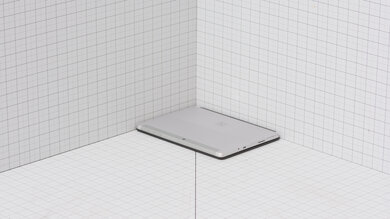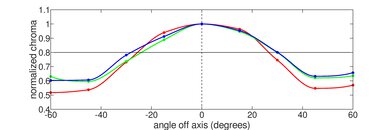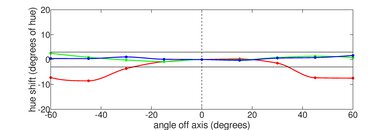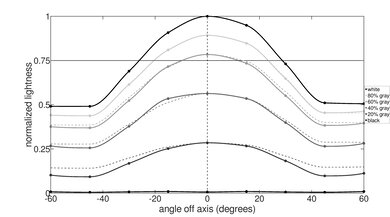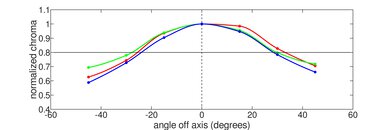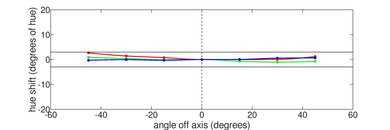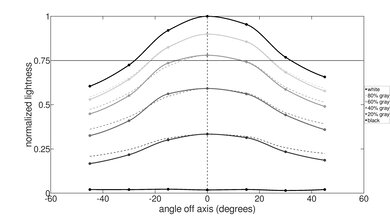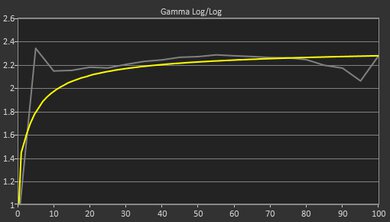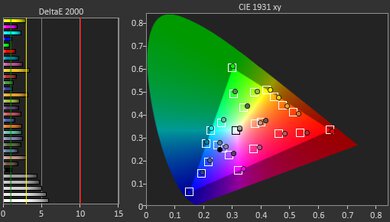The Microsoft Surface Go 3 is a 10.5 inch Windows tablet with a kickstand and a detachable keyboard. It looks nearly identical to its predecessor, the Microsoft Surface Go 2 (2020), and it feels just as well built, sporting a sturdy magnesium chassis. It has a sharp display that gets bright enough for use in most settings; however, its small size makes it hard to multitask, and the backlight flickers unless you set the brightness to maximum, which may cause eye strain for some people. The type cover keyboard provides a good typing experience, and the touchpad tracks well, but like the Surface Go 2, it's an accessory that you have to purchase separately. Its Intel CPU and integrated graphics can only handle simple tasks like web browsing and video playback, so it isn't ideal for demanding workloads like gaming or video editing. Unfortunately, the battery provides less than eight hours of light productivity, and its port selection is terrible as it only has a single USB-C port for wired peripherals, so you'll likely need a dock or dongles.
Our Microsoft Surface Go 3 has an Intel Core i3-10100Y CPU, integrated Intel UHD Graphics 615, 8GB of memory, and 128GB of storage. You can get a model with an Intel Pentium Gold 6500Y, but it's slower than the Core i3-10100Y, so unless your workload is extremely light, it's best to get the Core i3 model for the smoothest experience. There's a Pentium Gold model with 4GB of RAM and 64GB of eMMC storage; however, it won't perform as well because 4GB of memory may cause slowdowns or stutters, and the eMMC storage is significantly slower than the 128GB SSD, causing the computer to boot up and launch apps more slowly. You can get a model with LTE support for on-the-go connectivity, but only on a Core i3 model with 8GB of RAM.
Our Verdict
The Microsoft Surface Go 3 is decent for school use. It's a very portable device as it's compact and lightweight, and its battery lasts a little over seven hours of light productivity, so depending on your school schedule, you might be able to get through the day on a full charge. The display is sharp and colorful, but it doesn't provide much screen real estate for multitasking. The keyboard is comfortable to type on, though, and the touchpad tracks well. Its Intel CPU and integrated graphics can handle simple tasks like web browsing and text formatting, but they aren't ideal for demanding workloads like graphic design or 3D animation.
-
Compact and lightweight.
-
Feels well-built.
-
Display gets bright enough for use in most settings.
-
Outstanding webcam video quality for video calls.
-
Keyboard feels good to type on.
-
Small screen isn't ideal for multitasking.
-
Low-power CPU and integrated graphics can't handle demanding workloads.
-
Only one USB port.
-
Small touchpad.
The Microsoft Surface Go 3 is bad for gaming. It's only available with a low-power CPU and integrated graphics, which aren't powerful enough to run demanding titles. It also has a 60Hz display with a slow response time and no VRR support to reduce screen tearing.
-
Doesn't get hot under load and silent due to its fanless design.
-
Low-power CPU and integrated graphics can't handle demanding workloads.
-
60Hz display with no VRR support.
-
Only one USB port.
-
GPU throttles under load.
The Microsoft Surface Go 3 is good for media consumption. It's a very compact device that's easy to carry around, and since it's a tablet, you can detach the type cover keyboard to make it even lighter. The display is sharp, bright, and colorful, and the speakers sound decent but not very loud. Unfortunately, the battery lasts less than 4 hours of video playback, so you'll have to carry the power adapter with you.
-
Compact and lightweight.
-
Display gets bright enough for use in most settings.
-
Can be used as a tablet.
-
Decent-sounding speakers.
-
Battery lasts less than four hours of video playback.
-
Blacks look gray in dim settings.
-
Low speaker volume.
The Microsoft Surface Go 3 is bad as a workstation. It has a low-power CPU with integrated graphics, which are only capable of handling simple tasks like web browsing and video playback, not demanding workloads like video editing or 3D rendering. Also, its GPU throttles under load. Its port selection is terrible as it only has a single USB-C port, so you'll likely need a dock if you want to connect multiple peripherals.
-
Doesn't get hot under load and silent due to its fanless design.
-
Low-power CPU and integrated graphics can't handle demanding workloads.
-
Only one USB port.
-
GPU throttles under load.
The Microsoft Surface Go 3 is mediocre for business use. It's a compact device that's easy to carry around, but its battery doesn't last long enough for a typical eight-hour workday, and its small display means you don't get much space for multitasking. That said, the keyboard feels good to type on, the touchpad is small but responsive, and the webcam's video quality is outstanding. Its Intel CPU can handle simple tasks like text formatting and web browsing, but it struggles in demanding workloads that involve a lot of number crunching. Unfortunately, the port selection is terrible as it has a single USB-C port, so you'll likely need a dock or dongles if you want to connect multiple peripherals or an external display.
-
Compact and lightweight.
-
Feels well-built.
-
Display gets bright enough for use in most settings.
-
Outstanding webcam video quality for video calls.
-
Keyboard feels good to type on.
-
Small screen isn't ideal for multitasking.
-
Battery doesn't last through a typical 8-hour workday.
-
Low-power CPU and integrated graphics can't handle demanding workloads.
-
Only one USB port.
-
Small touchpad.
- 7.3 School
- 4.1 Gaming
- 7.8 Multimedia
- 4.3 Workstation
- 6.4 Business
- Updated Mar 01, 2023: Added mention of the Lenovo Chromebook Duet 3 (2022) as an alternative with longer battery life in the Battery section.
- Updated Feb 14, 2022: We've uploaded a new hinge photo because the previous one wasn't showing the hinge's full range.
- Updated Feb 09, 2022: Review published.
- Updated Feb 04, 2022: Early access published.
- Updated Jan 24, 2022: Our testers have started testing this product.
- Updated Dec 13, 2021: The product has arrived in our lab, and our testers will start evaluating it soon.
- Updated Nov 29, 2021: We've purchased the product and are waiting for it to arrive in our lab.
Differences Between Sizes And Variants
We tested the Microsoft Surface Go 3 with an Intel Core i3-10100Y CPU, integrated Intel UHD Graphics 615, 8GB of memory, and 128GB of storage. The CPU, memory, and storage are configurable; you can see the available options in the table below.
| Screen |
|
|---|---|
| CPU |
|
| GPU |
|
| Memory |
|
| Storage |
|
| Color |
|
Our display and performance results are only valid for the configuration we tested. If you come across a different configuration option not listed above, or you have a similar Microsoft Surface Go 3 that doesn't correspond to our review, let us know, and we'll update it. Some tests, like black uniformity and color accuracy, may vary between individual units.
You can see our unit's label here.
Compared To Other Laptops
Compared to other 2-in-1 laptops in its price range, the Microsoft Surface Go 3 stands out for its build, as well as the quality of its display and webcam. However, its Intel CPU is underpowered, as you can easily find a similarly-priced Windows laptop with a much more powerful processor. There are also better Chromebooks in this price range if you don't need a full operating system like Windows, and they generally run smoother because Chrome OS is a much lighter operating system.
For other options, check out our recommendations for the best laptops under $300, the best laptops under $400, and the best laptops under $500.
The Microsoft Surface Go 3 (2021) and the Microsoft Surface Pro 8 (2021) are both Windows tablets with detachable keyboards. The Surface Pro is better overall; it has a sharper, brighter, more color-accurate display with a 120Hz refresh rate, a better-spaced keyboard and larger touchpad, and two USB-C ports that both support Thunderbolt 4. Also, the Surface Pro is available with more powerful Intel Core i5 and i7 CPUs, and it has a user-replaceable SSD. The Surface Go is lighter and more compact, so it's easy to bring around, but its screen flickers below 100% brightness, which can cause eye strain and headaches in people who are sensitive to strobing.
The Microsoft Surface Go 3 (2021) is a newer version of the Microsoft Surface Go 2 (2020). They're nearly identical in most aspects; however, the Go 3 is available in a new matte black finish and with more powerful CPUs. The only other notable differences are that the Go 3 has shorter battery life, and its backlight flickers when you set the brightness below 100%, which can cause eye strain for some people.
The Microsoft Surface Go 3 (2021) is marginally better than the Lenovo Chromebook Duet 3 (2022) for most uses. The Surface Go 3 is slightly more compact, making it easier to carry around, and it has a significantly better keyboard, touchpad, and webcam. However, its display doesn't get as bright as the Duet 3's, and its battery life is much shorter. Also, you need to buy the Surface Go 3's keyboard separately, while the Duet 3 comes with the keyboard.
The Microsoft Surface Go 3 (2021) and the HP Pavilion x360 11 (2021) are both 2-in-1 convertible Windows laptops. However, the Microsoft is a tablet with a kickstand and detachable keyboard, while the HP is more of a traditional laptop with a 360-degree hinge. The Microsoft provides a better user experience overall because it has a sharper and brighter display, a more comfortable keyboard, and a more responsive touchpad. The Microsoft also has a better webcam for video calls and a Windows Hello IR camera to log in quickly via facial recognition. On the other hand, the HP has a much wider port selection, and its battery lasts longer.
The Microsoft Surface Go 3 (2021) and the Lenovo Chromebook Duet 5 (2021) are 2-in-1 convertible laptops. However, the Microsoft has a 10.5 inch screen and runs Windows, while the Lenovo has a 13.3 inch screen and runs Chrome OS. If you intend to use the device mainly for media consumption, the Lenovo is better because it has an OLED panel with better picture quality. The Lenovo also has a much longer battery life, lasting three hours longer than the Microsoft for productivity and video playback. On the other hand, if you plan on doing some work, the Microsoft has a better keyboard and touchpad.
The Microsoft Surface Go 3 (2021) and the HP ENVY x360 13 (2020) are both 2-in-1 convertible Windows laptops. However, the ENVY x360 has a traditional clamshell design with a 360-degree hinge, while the Surface Go 3 is more of a tablet with a kickstand and detachable keyboard. The ENVY x360 provides a better user experience because it has a larger display, a more comfortable keyboard, and a wider port selection. It's also available with much more powerful Intel and AMD CPUs that can handle heavier workloads, and its battery lasts longer. However, the Surface Go 3 has a much better webcam for video calls, and its compact size makes it more portable.
The Microsoft Surface Go 3 (2021) and the Apple MacBook Pro 2019 are very different. The MacBook Pro is a 16 inch macOS laptop with a powerful H-series processor and AMD Radeon dedicated graphics. The Surface Go 3 is a 10.5 inch Windows tablet with a built-in kickstand and detachable keyboard. The MacBook Pro is better in nearly every aspect, but the Surface Go 3 may be a better choice if you only need a compact device to perform simple tasks on the go.
The Microsoft Surface Go 3 (2021) and the Lenovo Chromebook Duet (2020) are both 2-in-1 convertible laptops with a kickstand and detachable keyboard. However, the Microsoft runs Windows, while the Lenovo runs Chrome OS. The Microsoft is better for most uses, but the Lenovo has much longer battery life, and it might be a better choice if you intend to use it as a tablet because Chrome OS is easier to navigate through touch input.
Test Results
The Microsoft Surface Go 3 is a compact 10.5 inch tablet with a built-in kickstand and a detachable keyboard. The design is nearly identical to its predecessor, the Microsoft Surface Go 2 (2020), but it's now available in a Platinum or Matte Black finish. The bezels are a bit thick on all sides, though they provide a place to hold the tablet without triggering its touch-sensitive screen. The type cover keyboard is an accessory that you have to purchase separately, and it's the same type cover as the Microsoft Surface Go 2, so they're interchangeable. You can get it in black with a microfiber finish or an Ice Blue, Poppy Red, or Platinum color scheme with an Alcantara finish. Like most 2-in-1 tablets with a similar design, it isn't the most lap-friendly device because most of the weight is in the display, and the keyboard doesn't help stabilize it, so it feels wobbly on a lap and can easily tip over if you aren't careful.
The Microsoft Surface Go 3 has great build quality. It has a magnesium chassis that feels high quality, and its kickstand's hinge feels smooth and strong. The type cover flexes, especially when typing with the keyboard at an incline, but it doesn't feel cheap.
Update 02/14/2022: We've uploaded a new photo because the previous one wasn't showing the hinge's full range.
The Microsoft Surface Go 3's kickstand hinge is okay. It feels smooth when opening and closing, and it feels stable no matter which angle it's set to. There are grooves on the sides to make it easier to open when fully closed.
The Microsoft Go 3 and its included power adapter are very compact and lightweight, so you should be able to fit them easily into most bags. The posted measurements were taken with the type cover keyboard attached; here are the measurements for the tablet itself:
- Thickness: 0.33 inches (0.83 cm)
- Width: 9.65 inches (24.5 cm)
- Depth: 6.89 inches (17.5 cm)
- Weight: 1.18 lbs (0.536 kg)
The Microsoft Surface Go 3 isn't serviceable. It's hard to open the tablet without risking damage, and all the components are soldered onto the motherboard anyway. Opening the laptop or changing the hardware may void the manufacturer's warranty.
The Microsoft Surface Go 3's screen displays a sharp image due to its high pixel density. Its 3:2 aspect ratio gives you more vertical space so that you don't have to scroll as much in landscape mode, and it also makes the screen feel less narrow when in portrait mode. However, this means that you'll see black bars at the top and bottom when viewing standard 16:9 content. If you're interested in a Windows tablet but prefer having a larger, crisper display, consider the Microsoft Surface Pro 8 (2021).
The Microsoft Surface Go 3 has a basic 60Hz refresh rate with no VRR support, typical for a device in its class. There's visible ghosting in fast-moving scenes because the response time is slow, and there's also image duplication caused by the backlight's flicker.
The Microsoft Surface Go 3's contrast ratio is decent and within the typical range for most IPS panels, but it still isn't enough to produce deep blacks for a good dark room viewing experience. The contrast ratio can vary between individual units, but most units will still be in the same ballpark.
The Microsoft Surface Go 3's maximum screen brightness is decent. It's bright enough for use in most lighting conditions but not outdoors in broad daylight. It gets very dim at the lowest brightness setting, so it's easier on the eyes when viewing content in the dark.
The Microsoft Surface Go 3 has decent reflection handling. Its glossy finish struggles mostly with direct reflections, so it's best to avoid having bright light sources right behind you shining at the screen. The photo looks brighter than other laptop reviews because it was taken in a different testing room.
The Microsoft Go 3 has exceptional black uniformity. The whole screen looks slightly gray, but it's otherwise very uniform, with no backlight bleed or IPS glow. There are some faint smudges, but they're hard to spot. Black uniformity varies between units due to manufacturing tolerances.
The Microsoft Surface Go 3 has okay horizontal viewing angles. The image looks dimmer and washed out from the side. You can move a little to the left or right without losing much image quality, but it's best to be directly in front of the screen if you want perfect accuracy. The flickering in the video is an artifact caused by the camera and isn't visible in person.
The vertical viewing angles are decent. Colors remain relatively accurate until you reach a steeper angle from above or below, so you have a fair amount of play to tilt the screen to your preference.
The Microsoft Surface Go 3 has decent color accuracy out of the box. Most color inaccuracies are minor and hard to notice, but the white balance is off, especially at higher brightness levels. The color temperature is slightly warmer than our 6500K target, giving the image a barely noticeable reddish tint. The gamma isn't bad as it follows the sRGB curve for the most part, though dark scenes are too dark and bright scenes are too bright. Color accuracy can vary between individual units.
The Microsoft Surface Go 3 has an excellent color gamut. It covers the entire sRGB color space, meaning it can display all the colors used in standard web content. It has great Adobe RGB coverage, but it still isn't wide enough for professional photo editing. Likewise, its DCI P3 coverage is good, but its Rec. 2020 coverage is limited and too low to be considered a wide color gamut, so it isn't ideal for viewing or producing HDR content.
The Microsoft Surface Go 3 has a good keyboard. It's very compact as it's a 10.5 inch device, meaning it can feel a little cramped for people with medium to large hands. That said, the keys still feel sufficiently spaced. There's a good amount of key travel, especially for a type cover; however, the keys require a lot of force to actuate, which might cause some fatigue over an extended period. Because it's a thin type cover, the keyboard flexes a lot if you have it propped up at an incline. You can lay it flat on the table, but it might not feel as comfortable. There's backlighting, and you can toggle through the three brightness levels directly on the keyboard using the F1 hotkey.
The Microsoft Go 3 has a decent touchpad. Although it's small, it feels high-quality, and it tracks well. It responds to all movements and gestures, and there aren't any issues with palm rejection. You can click towards the top of the touchpad, but it requires more force. Note that the type cover is the same as the Microsoft Surface Go 2 (2020)'s; the only difference is that this has a microfiber finish, while the one we bought for the Surface Go 2 has an Alcantara finish. There are some differences in the measurements of the touchpad compared to the Alcantara version, but the difference is tiny. That said, the tracking is a little different as this one seems to respond more consistently and more accurately overall.
The Microsoft Surface Go 3 has decent speakers. There's a bump in the high-mid frequencies to emphasize vocals and leads, making them well-suited for spoken content; however, there's almost no bass, and the high frequencies drop off pretty early. They also don't get very loud, but on the bright side, there's minimal dynamic compression at max volume, so content still sounds rich and full.
The webcam's video quality is outstanding. Although slightly overexposed, the image has lots of fine details, and the colors look natural. Audio sounds clear over the microphone with little to no background noise, but voices sound slightly nasal. There's an 8MP camera and a microphone on the back if you need to show something during a video call; here's a sample of the video quality. The video is slightly shaky, but it gives an idea about the camera's video quality.
The Microsoft Surface Go 3 has a bad port selection. Its single USB-C port supports USB 3.2 Gen 1 data transfer speed (up to 5Gbps), and you can also use it to charge the tablet or connect an external display at a maximum resolution of 4k @ 60Hz. The Surface Connect port is compatible with Microsoft's Surface Dock 2. There's a MicroSD card slot underneath the kickstand, and models with LTE support have an additional Nano SIM tray on the side.
The Microsoft Surface Go 3's wireless adapter is an Intel Wi-Fi 6 AX200. There's a variant with LTE connectivity (Core i3 with 8GB RAM model), and it has a Qualcomm Snapdragon X16 LTE modem.
You can configure the Microsoft Surface Go 3 with an Intel Pentium Gold 6500Y or an Intel Core i3-10100Y CPU. Both processors are designed for simple tasks like web browsing, video playback, and text formatting. However, the Core i3-10100Y is faster and will provide a smoother experience overall.
The Intel Pentium Gold 6500Y and the Intel Core i3-10100Y have the same Intel UHD Graphics 615. It's an integrated GPU that can only handle light tasks, not demanding workloads like video editing or gaming. The Core i3's GPU has one more execution unit and runs at a slightly faster clock speed, but the difference isn't noticeable in real-world usage.
You can configure the Microsoft Go 3 with 4GB or 8GB of memory. It's best to opt for an 8GB model because 4GB is barely enough for the operating system and can cause slowdowns or stutters.
The Microsoft Surface Go 3 is available with a 64GB of eMMC drive or a 128GB PCIe NVMe SSD; however, you can only get the 128GB storage if you also upgrade the memory to 8GB. It's best to get a model with a 128GB SSD because it gives you more headroom to store files locally, and the SSD is significantly faster than eMMC storage, making the system feel more responsive and snappy.
The Microsoft Surface Go 3 with an Intel Core i3-10100Y performs poorly in the Geekbench 5 benchmarks, scoring very low in all three tests. Essentially, the CPU and GPU can handle general productivity tasks like web browsing and text formatting; however, they'll struggle if you run demanding applications like video editing or 3D rendering software or have too many programs running simultaneously. The Intel Pentium Gold 6500Y will perform worse overall, but it'll still be faster than the Intel Pentium Gold 4425Y in the Microsoft Surface Go 2 (2020).
The Microsoft Surface Go 3 with an Intel Core i3-10100Y isn't suitable for 3D rendering tasks as it takes nearly a half-hour to complete the simple bmw27 scene. Blender doesn't support the integrated GPU; however, it'll likely take much longer to render the same scene than the CPU. The Intel Pentium Gold 6500Y is a slower processor and will take even longer to complete the render.
The 128GB SSD's performance is great. It has fast sequential and random read speeds, so the system boots up and launches apps quickly, but it can take a while to copy a large file or install a large app because its sequential write speed is a little slow. The 64GB eMMC will be significantly slower overall.
The Microsoft Surface Go 3's battery life is sub-par. It doesn't last through a typical eight-hour workday, so you'll have to plug it in at some point for a quick charge. Video playback drains the battery a lot faster, giving you only enough time to get through a movie or two at the most. The battery life is very short when gaming, but it's still better than most gaming laptops with a dedicated GPU. Microsoft's specifications indicate that the battery size varies slightly between units, from a minimum of 26.8Wh to a maximum of 28Wh. Microsoft also advertises the LTE models to have slightly shorter battery life. If you want a compact 2-in-1 tablet with longer battery life, check out the Lenovo Chromebook Duet 3 (2022).
Borderlands 3 isn't playable on the Microsoft Go 3. It keeps crashing on DirectX 12, and even though it runs on DirectX 11, the average frame rate at the lowest graphical settings is in the single digits. The Intel Pentium Gold 6500Y model likely won't even run the game.
Civilization VI isn't playable on the Microsoft Surface Go 3. The average frame rate at the lowest graphical settings is too low, even for a turn-based game, and the turn time is extremely long. Performance on the Intel Pentium Gold 6500Y model will be worse.
CS:GO runs terribly on the Microsoft Surface Go 3. The average frame rate doesn't even reach 30fps at the lowest graphical settings, and there are a lot of stutters and freezes, which isn't ideal for an FPS game. The Intel Pentium Gold 6500Y model will perform worse.
Shadow of the Tomb Raider isn't playable on the Microsoft Go 3. It keeps crashing before it gets to the main menu, whether the game runs in DirectX 11 or DirectX 12.
The Microsoft Surface Go 3 has superb thermal and noise performance. The heat doesn't affect the keyboard because all the components are on the tablet side. The tablet itself doesn't get very hot under load as it only reaches a maximum of 41°C, with the hottest spot being near the bottom of the device in landscape mode. It's completely silent at all times because it's a fanless device.
The Microsoft Surface Go 3's performance over time is decent. The CPU and GPU temperatures are relatively low under load, likely to avoid making the tablet uncomfortable to hold. The performance loss on the CPU is minor and isn't noticeable in most instances. The performance loss on the GPU is noticeable, but only if you perform graphically intensive tasks that push GPU utilization to near 100%.
The Microsoft Surface Go 3 ships with Windows 11 in S mode, a stripped-down version of Windows designed for low-end hardware. S mode generally runs smoother because there are fewer background system processes. However, it only lets you install apps from the Windows Store, meaning you can't install third-party apps like Google Chrome or Mozilla Firefox. You can switch out of S mode, but you can't go back to it once you've activated the full version of the operating system. There aren't any other pre-installed software applications aside from those that typically come with Windows.
The Microsoft Surface Go 3 has a Windows Hello compatible IR camera so that you can log in quickly using facial recognition. There's support for pen input; however, you have to buy the stylus separately. Official first-party styluses are available, but any stylus that supports Microsoft Pen Protocol will work.





